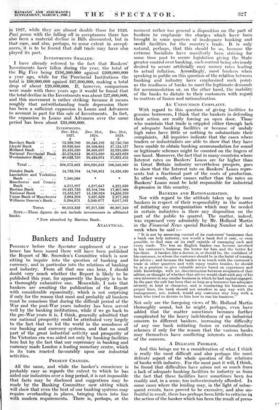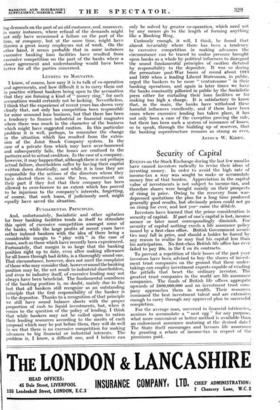Bankers and Industry
POSSIBLY before the .Spectator supplement of a year hence has been issued there will have been published the Report of Mr. Snowden's .Committee which is now sitting to inquire into the question of banking and currency, and in particular into the relations of banking and 'industry. From all that one can hear, I should doubt very much whether the Report is likely to be published this year, fox apparently the Inquiry is to be a thoroughly exhaustive one. Meanwhile, I note that bankers are awaiting the publication of the Report with considerable equanimity, which is not surprising if only for the reason that most and probably all bankers must be conscious that during the difficult period of the War and the post-War years industry has been served Well by the banking institutions, while if we go back to the pre-War years it is, I think, generally admitted that our national prosperity could be attributed very largely to the fact that we led the world in the soundness of our banking and currency 'systems, and that no small Part of the great industrial activity and prosperity of the Victorian era was aided not only by banking facilities here but by the fact that our supremacy in banking and currency made London a leading monetary centre, which in its turn reacted favourably upon our industrial activities.
PRESENT CHANGES.
All the same, and while the banker's -conscience is probably easy as regards the extent to which he has aided our industries over a long period, it is not impossible that facts may be disclosed and suggestions may be made by the Banking Committee now sitting which will show that even the best -of our banking systems may require overhauling in places, bringing them into line with modem requirements. There is, perhaps, at the moment rather too general a disposition on the part of bankers to emphasize the charges • which lave- been brought in some quarters of inadequate banking and credit facilities for the country's trade. It is only natural, perhaps, that 'this should be so, because the extreme Socialists have manifestly been striving fOr some time past to secure legislation giving the State greater control over banking, such control being obviously desired to secure artificially easy money rates leading to actual inflation. Accordingly, most bankers when speaking in public on this question of the relation between banking and industry have emphasized such points as the readiness of banks to meet the legitimate demands for accommodation or, on the other hand, the inability of the banks to dictate to their customers with regatid to matters of fusion and rationalization.
AN UNFOUNDED COMPLAINT.
With regard to this question of giving facilities to genuine borrowers, I think that the bankers in defending their action are really forcing an open door. Those who maintain that trade is crippled either through lack of adequate banking facilities or because of unduly high rates have little or nothing to substantiate their complaints. All inquiries indicate that the cases where traders or industrialists are able to show that they have been unable to obtain banking accommodation for sound or legitimate schemes might be counted on the fingers of one hand. Moreover, the fact that in many countries where Interest rates on Bankers' Loans are far higher than in Great Britain industry nevertheless prospers, goes to show that the Interest rate on Bankers' Loans repre- sents but a fractional part of the costs of production. In other words, other causes rather than the -rates on Bankers' Loans must be held responsible for industrial depression in this country.
BANKERS AND RATIONALIZATION.
Nor with regard to the attitude taken up by most bankers in respect of their responsibility in the matter of initiating any reorganization which may be needed in certain industries is there any disposition on the part of the public to quarrel. The matter, indeed, was - expressed very admirably by Mr. Holland Martin in the Financial News special Banking Number of last week when he said :— _"_It is not by assuming control of its customers' businesses that a bank can help industry, nor would a bank feel it easy, or even possible, to find men on its staff capable of managing each and every trade. The less an English banker can become involved in his customer's business, the better for him and the better for his client. A banker, like a doctor, is, or should be, the confidant of his customer, to whom the customer should be in the habit of turning for advice ; and because the banker is in touch with the customer's trade in other quarters and with many trades besides, he should be in a position to give valuable advice based on experience and wide knowledge, with no discrimination between recipients of that advice, or thought of whether that advice would elfish with any of, his own interests in any similar business in which he had capital engaged. Ig the past the rule has been that so long as a borrower hag adequate security in kind or character, and is Conducting his business on proper lines, the bank should not interfere in any way with the management, nor, indeed, would any customer stay long with. a bank who tried to dictate to him how to run his business."
Not only are the foregoing views of Mr. Holland .Martin thoroughly sound, but he might, perhaps, even have added that the matter sometimes becomes further complicated by the heavy indebtedness of an industrial concern to different bankers, increasing the • difficulty of any one bank initiating fusion or , rationalization schemes if only, for the reason that the' various banks May themselves have conflicting interests as ereditOrs of the concern.
A DELICATE PROBLEM.
And this brings me to a consideration of what I think is really the most difficult - and alsd perhaps the most delicate aspect of the whole question of the relations of banks with industry. For the most part it will, I think, be found that difficulties have arisen not so much from a:lack of adequate banking facilities to industry as from the fact that these .facilities have sometimes been too readily and, in sense; too indiscriminately afforded. In some cases where the lending may, in the light of subse- quent events; have proved `to be excessive; and also un- fruitful in result, there has perhaps been little to criticize in the action of the banker which has been the result of press- ing demands on the part of an old customer, and, moreover, in many instances, where refusal of the demands might not only have occasioned a failure on the part of the firm, or ,company, but at the same time, might have thrown a great many empkwees out of work. On the other hand, it seems probable that in some instances excessive banking loan facilities have resulted from excessive competition on the part of the banks where a closer agreement and understanding would have been better for all the parties concerned.
LENDING TO MAGNATES.
know, of course, -how- easy it is to talk of co-operation and agreements, and how difficult it is to carry them out in practice without bankers being open to the accusation that they are forming a kind of " money ring," for such accusations would certainly not be lacking. Nevertheless, I think that the experience of recent years has shown very clearly that, not only has competition been responsible for some unsound loan business, but that there has been a tendency to finance industrial or financial magnates where there was much in the character of the business which might have suggested caution. In this particular problem it is well, perhaps, to remember the change in the situation which has resulted from the exten- sion of the Joint Stock Company system. In the case of a private firm which may have over-borrowed and subsequently fails, the losses are confined to the partners and to actual creditors. In the case of a company, however, it may happen that, although there is not perhaps actual failure, shareholders suffer by having their capital written down drastically, and while it is true they are responsible for the actions of the directors whom they have elected there is, none the' less, resentment on their part if they feel that their company has been allowed to over-borrow to an extent which has proved to be injurious to the company's interests, forgetting, of course, that such loans, if judiciously used, might equally have saved the situation.
FUNDAMENTAL PRINCIPLES.
And, unfortunately, Socialistic and other agitation for freer banking facilities tends, in itself to stimulate. this spirit of excessive competition amongst some of the banks, while the large profits of recent years have rather imbued bankers with the idea of there being a considerable margin to " play with " in the case of losses, such as those which have recently been experienced. Fortunately, that margin is so large that the banking position right up to date, even after making allowance for all losses through bad debts, is a thoroughly sound one. That circumstance, however, does not meet the complaint of those who may consider that, however sound the banking position may be, the net result to industrial shareholders, and even to industry itself, of excessive lending may not always have been beneficial. The fundamental soundness of the banking position is, no doubt, mainly due to the fact that all bankers still recognize as an outstanding principle that the first responsibility of the banker is to the depositor. Thanks to a recognition of that principle we still have sound balance sheets with the proper proportion of cash to liquid investments, but, when it comes to the question of the policy of lending, I think that while bankers may not be called upon to ration their lending resources according to the merits of each proposal which may be put before them, they will do well to see that there is no excessive competition for making advances to big financial or industrial interests. The problem is, I know, a difficult one, and I believe can only be solved by greater 'co-operation, which need net by any means go to the length of forming anything like a Banking Ring.
Curiously enough, it will, I think, be found that almost invariably where there has been a tendency to, excessive competition in making advances the circumstance can be traced to undue pressure brought upon banks as a whole by political influences to disregard the sound fundamentiil principles Of caution dictated by responsibility to the depositor. It was so during the premature post-War boom of round about 1019 and 1920 when a leading Liberal Statesman, in public, urged the bankers to be more " venturesome " in their banking operations, and again in later times we havo the banks constantly pilloried in public by the Socialistic pros either for curtailing their loan facilities or for making too high a charge. It is satisfactory to know that, in the main, the banks have withstood 'these harmful influences excellently, and- if there have been cases where excessive lending has taken place, it has not only been a case of the exception proving the rule; but there has been such a system of insurance of losses, so to speak, -through the building up of reserves, that the banking superstructure remains as strong as ever,
ARTHUR W. KIDDY.

























































 Previous page
Previous page